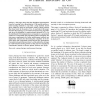Free Online Productivity Tools
i2Speak
i2Symbol
i2OCR
iTex2Img
iWeb2Print
iWeb2Shot
i2Type
iPdf2Split
iPdf2Merge
i2Bopomofo
i2Arabic
i2Style
i2Image
i2PDF
iLatex2Rtf
Sci2ools
118
Voted
ICMLA
2003
2003
A Distributed Reinforcement Learning Approach to Pattern Inference in Go
— This paper shows that the distributed representation found in Learning Vector Quantization (LVQ) enables reinforcement learning methods to cope with a large decision search space, defined in terms of equivalence classes of input patterns like those found in the game of Go. In particular, this paper describes S[arsa]LVQ, a novel reinforcement learning algorithm and shows its feasibility for pattern-based inference in Go. As the distributed LVQ representation corresponds to a (quantized) codebook of compressed and generalized pattern templates, the state space requirements for online reinforcement methods are significantly reduced, thus decreasing the complexity of the decision space and consequently improving the play performance from pattern-based inference alone. A novel exploration strategy for reinforcement learning based on tabu search is introduced. Experimental results are shown against Minimax and Wally. Keywords– game playing, reinforcement learning
ICMLA 2003 | ICMLA 2007 | Pattern-based Inference | Reinforcement Learning | Reinforcement Learning Methods |
Related Content
| Added | 31 Oct 2010 |
| Updated | 31 Oct 2010 |
| Type | Conference |
| Year | 2003 |
| Where | ICMLA |
| Authors | Myriam Abramson, Harry Wechsler |
Comments (0)

